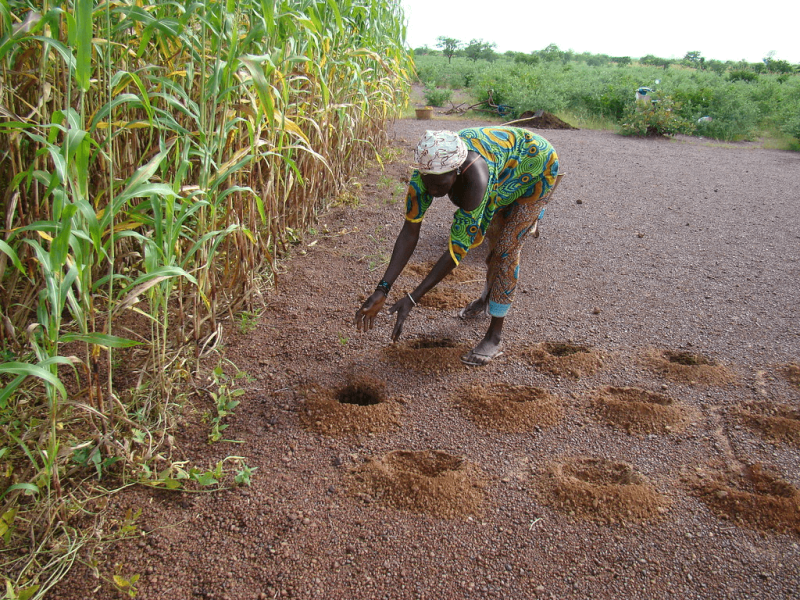Viewpoint: 200 million Africans are chronically malnourished and 5 million die of hunger each year. The continent can’t rely on agroecology alone
Viewpoint: 200 million Africans are chronically malnourished and 5 million die of hunger each year. The continent can’t rely on agroecology alone


A report by the Alliance for a Green Revolution in Africa (AGRA) indicates that despite a decade of pro-growth and food security policies and programmes such as the Comprehensive Africa Agricultural Development Programme (CAADP), 200 million Africans are chronically malnourished and five million die of hunger annually.
Proponents of agroecology have always fronted it as the ultimate solution to the African food security problem. They champion indigenous approaches, resisting the industrialisation of African agriculture, and rejecting both the use of genetic engineering and the privatisation of living organisms.
But when locusts for instance invade a farm, would you advise farmers not to use pesticides, for example?
A model of agroecology that limits farming inputs to solely indigenous materials is too restrictive to transform the sector.
It is prone to meet resistance from farmers. Such rigid paradigms shall at their best seek not to transform, but to trap farmers in unending poverty.
The urgent need to transform Africa’s agriculture has led to the rise of several advocacy groups. Others, however, in the name of advocating for holistic and sustainable models, are knowingly or unknowingly pushing Africa to traditional methods that have proved futile over the years.
This is an excerpt. Read the original post here

 | Videos | More... |

Video: Nuclear energy will destroy us? Global warming is an existential threat? Chemicals are massacring bees? Donate to the Green Industrial Complex!
 | Bees & Pollinators | More... |

GLP podcast: Science journalism is a mess. Here’s how to fix it

Mosquito massacre: Can we safely tackle malaria with a CRISPR gene drive?

Are we facing an ‘Insect Apocalypse’ caused by ‘intensive, industrial’ farming and agricultural chemicals? The media say yes; Science says ‘no’
 | Infographics | More... |

Infographic: Global regulatory and health research agencies on whether glyphosate causes cancer
 | GMO FAQs | More... |

Why is there controversy over GMO foods but not GMO drugs?

How are GMOs labeled around the world?

How does genetic engineering differ from conventional breeding?
 | GLP Profiles | More... |

Alex Jones: Right-wing conspiracy theorist stokes fear of GMOs, pesticides to sell ‘health supplements’




 Viewpoint — Fact checking MAHA mythmakers: How wellness influencers and RFK, Jr. undermine American science and health
Viewpoint — Fact checking MAHA mythmakers: How wellness influencers and RFK, Jr. undermine American science and health Viewpoint: Video — Big Solar is gobbling up productive agricultural land and hurting farmers yet providing little energy or sustainabilty gains
Viewpoint: Video — Big Solar is gobbling up productive agricultural land and hurting farmers yet providing little energy or sustainabilty gains Fighting deforestation with CO2: Biotechnology breakthrough creates sustainable palm oil alternative for cosmetics
Fighting deforestation with CO2: Biotechnology breakthrough creates sustainable palm oil alternative for cosmetics Trust issues: What happens when therapists use ChatGPT?
Trust issues: What happens when therapists use ChatGPT? 30-year-old tomato line shows genetic resistance to devastating virus
30-year-old tomato line shows genetic resistance to devastating virus California, Washington, Oregon forge immunization alliance to safeguard vaccine access against federal undermining
California, Washington, Oregon forge immunization alliance to safeguard vaccine access against federal undermining The free-range chicken dilemma: Better for birds, but with substantial costs
The free-range chicken dilemma: Better for birds, but with substantial costs ‘You have to treat the brain first’: Rethinking chronic pain with Sanjay Gupta
‘You have to treat the brain first’: Rethinking chronic pain with Sanjay Gupta
